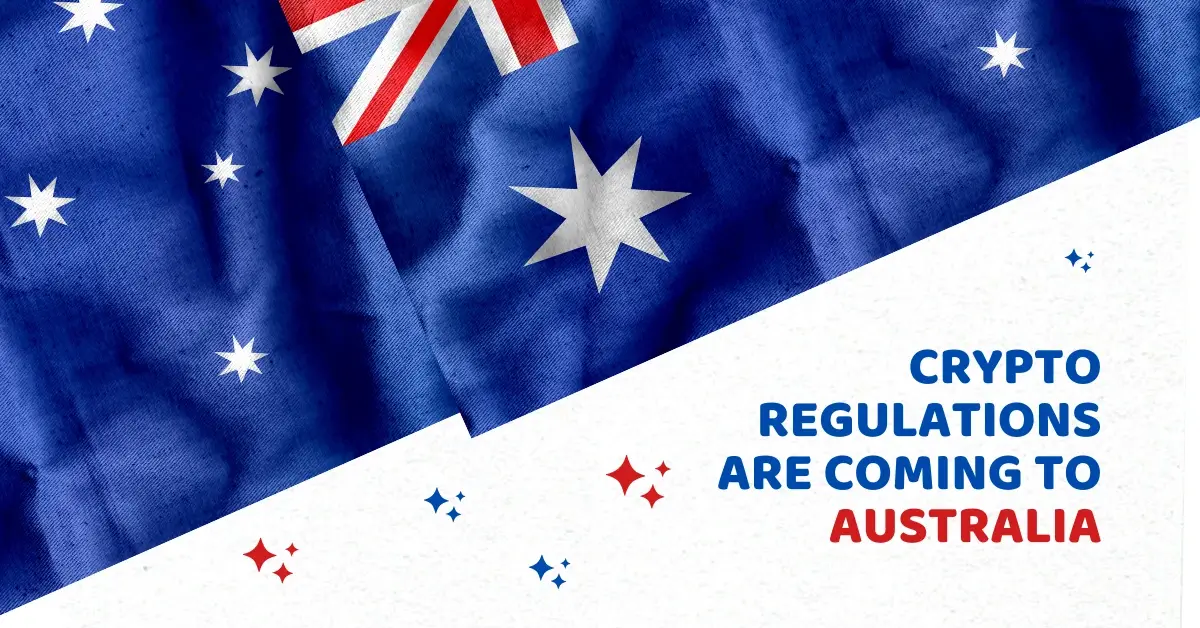Australia: Here is What you Need to Know About the Coming Crypto Regulation
How will Australia's incoming crypto regulation affect you and what does it mean for crypto taxes if anything?

On the 22nd of August 2022, the new Australian Government led by Labor leader Anthony Albanese sent an unmistakable and direct message to the Australian public via a media release saying that it is going to regulate the cryptocurrency industry.
This will very likely include licensing and rules covering the marketing of financial services.
"Australians are experiencing a digital revolution across all sectors of the economy, but regulation is struggling to keep pace and adapt with the crypto asset sector" Australian Treasurer Jim Chalmers
Of course, they say, this is all in the name of protecting consumers. “As it stands, the crypto sector is largely unregulated, and we need to do some work to get the balance right so we can embrace new and innovative technologies while safeguarding consumers,” Chalmers said in a recent statement.
Then adding:
"As the first step in a reform agenda, Treasury will prioritize ‘token mapping’ work in 2022, which will help identify how crypto assets and related services should be regulated. This hasn’t been done anywhere else in the world, so it will make Australia leaders in this work."
Before we look at what 'token mapping' is and what regulation might look like, let's first consider where Australia stands on crypto.
Australia is one of the largest crypto hubs; the country has over 28.8% of its citizens investing in cryptocurrencies. As a crypto enthusiast who has seen how people worldwide view cryptocurrencies (with high criticism), Australia is the definition of rapid crypto adoption.
Just a couple of years ago 350k letters were sent to cryptocurrency investors, the assistant commissioner at the Australian Tax Office said, "There isn't a game of hide and seek. We have got that information, and all we are asking people to do is follow the rules."
While many investors may honestly want to adhere to these current guidelines, a majority still don't know what the rules are, and for good reason, because they are confusing. If you haven't the slightest idea whatsoever of what crypto tax laws apply in Australia, worry not; we have got you covered. This guide will now briefly look into the Australian crypto tax scheme.
Your Australian Crypto Tax Guide
While regulation and tax are not the same, they are connected in a way because it is an insight into how the government might act on crypto in the future based on how they currently tax it. The ATO of Australia set a few guidelines that determine the type of taxation of crypto assets: income tax and capital gain tax.
Income Tax
Income tax is the revenue paid to the ATO as tax for the earnings received in a particular period. It's the most common type of tax in the financial space. The income tax a crypto investor should pay depends on the tax bracket they fall in.
The tax tiers are as follows;
Crypto Income Tax Events
While income tax is the most common tax, not all crypto activities fall under the income tax bracket. So, what are some of the main income tax events? Here are a few;
Receive Crypto Incomes
When you earn crypto as a salary, it triggers an income tax event.
Mining as a business
The value of the crypto you receive when mining is a taxable income if you are running a crypto business.
Selling self-minted NFT
If you mint and sell NFTs, the proceeds are taxable income. Any further secondary gains are also income.
Interest in lending and staking
Interest earned from lending or staking will be subject to income tax. The market value at the time of receipt is the income.
Airdrops
Tokens earned in airdrops are income based on their market value.
Referral bonuses
Referral bonuses are income.
Capital Gains Tax
Capital Gains Tax is the charge imposed on the profit gained after the disposal of an asset. It is calculated by deducting the acquisition value from the disposal value.
The value difference should either be a capital gain or loss. If it's a gain, it's taxed. For instance, if you hold crypto X for a year or more before selling, the ATO allows you to apply for CGT discounts. The formulae for getting the total taxable Capital Gains (TTCG) are as follows;
TTCG = (capital gains – capital losses) * capital gains discount = (capital proceeds – (cost basis + fees)) * capital gains discount
Capital gain discounts only apply if you held the asset for 12 months or more. Anything less autonomously disqualifies you from the CGT discounts.
Capital Gain Tax Events
Not all crypto activities are subject to capital gain tax, but most are (hah, of course, they are). Here are a few events that directly lead to the charging of capital gain tax;
Buying and selling crypto using fiat
Buying cryptocurrency alone does not trigger a capital gain taxable event. A capital gain taxable event immediately comes to life when you sell the crypto assets you purchased.
Crypto to crypto trades
Using one crypto to buy another triggers capital gain tax. If you use BTC to buy ETH, you are disposing of BTC.
Using crypto for purchases
Purchases of items for personal use are not taxable as long as it does not exceed A$10k. CGT is applied if the goods purchased for personal use exceed A$10k.
Buying and selling NFTs
Buying NFT using fiat like AUD is NOT a taxable event (currently). However, using crypto like ETH to buy an NFT is considered the disposal of crypto. Selling an NFT is a capital gain event.
Crypto gifts
Giving crypto gifts triggers a capital gain taxable event; the price of the coins when you gifted them out, minus when you acquired them. Receiving a crypto gift is not a taxable event. However, once you dispose of the gifts, you will be charged Capital gain taxes.
Mining as a hobby
For those mining crypto as a hobby, the acquired coins have a cost basis of zero. When disposed of, your disposal value will be charged for capital gain.
Loans
There is no taxable activity for borrowing crypto or repaying. There will be a CGT activity when you dispose of the borrowed assets.
Crypto Tax Deductions

In almost all jurisdictions, Australia included, there is always a way to offset your crypto tax. So, what can you do to reduce your cryptocurrency tax bill in Australia? Here are a few things to consider;
- Loss on the sale of crypto can help offset your capital gains.
- Long-term holders of crypto (more than 12 months) get discounts hitting 50%
- Gas fees/Transaction charges are expenses and must be deducted from capital gains.
- You can deduct the value of donated crypto.
- You can claim a capital loss if you lose your assets in hacking or theft. You must prove that your crypto is irrecoverable.
- Costs involved in mining or trading crypto are expenses.
Final Word on Taxes
One of the most important but controversial obligations for citizens worldwide is tax payments. Not paying taxes could do a number on your business activities, or worse. And where cryptocurrencies are involved, the tax-man can come off as 'bitter.' or just completely unreasonable.
In Australia, It is upon you, to find out how much 'tax room' you have when holding virtual currencies.
We don’t give advice generally, but you should consider giving Caeser what belongs to Caesar; evading tax could flip your whole world upside down. Avoiding tax is a whole other topic.
And if you're scratching your head wondering how Australia was able to tax cryptocurrencies without first regulating and classifying them, welcome to Earth!
This guide has so far looked into the crypto tax situation in Australia as it is. Let's now look at the coming crypto regulation in Australia.
Crypto Regulation Is Coming to Australia, Get Ready
What is Token Mapping?
Token Mapping is a new term used by the Australian Government and was first used by the government in a media release titled Work underway on crypto asset reforms.
Prior to this, the term 'token mapping' was introduced by Blockchain Australia in a paper titled Blockchain Australia – Submission to Senate Select Committee on Australia as a Finance and Technology Centre.
“Token Mapping” is token classification. This is a way for the Government to define different types of digital assets. As part of this defining process, it's expected that specific criteria will need to be met in order to group cryptocurrencies within specific categories so that they can be correctly regulated.
An understanding of the characteristics of tokens and mapping their characteristics such as the rights they confer to users, is an important first step in developing a framework that captures certain crypto-assets. Our preliminary view is that the approach taken by the FCA would be a good starting point. The FCA sets out three broad classes, being:
● e-money tokens
● security tokens
● unregulated tokens:
these are neither e-money tokens nor security tokens and include:
○ utility tokens; and
○ exchange tokens
In simple terms, in the token mapping process, it's expected a cryptocurrency such as BTC will be seen and therefore regulated differently from a stable coin such as USDC or the utility token used in Decentraland, MANA.
What Will Crypto Regulation Look Like in Australia?
While we can't know exactly how Australia will regulate cryptocurrency and what the ramifications of that will be, it's obvious to see where some of this will go.
More than likely Australia will regulate the introduction of cryptocurrencies, how they are created, advertised, and how they are used and it's likely this may have an effect on prices.
Australian Banking and Financial Regulations That Already Exist
To look at where we might end up with cryptocurrency regulation, it's probably a good idea to look at some of the already existing banking and financial regulations as this might give us some clues as to where we may end up with crypto regulation.
In Australia, banking and finance regulations are rooted in many statutes:
- the Banking Act
- the Anti-Money Laundering and Counter-Terrorism Financing Act
- the Reserve Bank Act
- the Financial Sector (Shareholdings) Act
- the Australian Securities and Investments Commission Act (AKA the ASIC Act)
- ...and a bunch of others.
Along with the rules, there are also voluntary guidelines such as ASIC’s ePayments Code and the Australian Banking Association’s Banking Code of Practice.
The regulatory authorities that exist to oversee banks and financial institutions are known as the Council of Financial Regulators (CFR). They are listed below:
- The Reserve Bank of Australia
- The Treasury
- Australian Prudential Regulation Authority (APRA)
- Australian Securities & Investments Commission (ASIC)
The Australian Competition & Consumer Commission (ACCC) and Australian Transaction Reports and Analysis Centre (AUSTRAC) also provide oversight and can act on some related matters.
What Are Some Notable Regulations and Protections?
Insured Deposits
In Australia, the government has guaranteed deposits up to A$250,000, so long as deposits are made through authorized deposit-taking institutions (ADIs).
Licenses
Australian banks that provide financial services are required to hold an Australian Financial Services Licence (AFSL). If the bank also offers credit, it's required to hold an Australian Credit Licence (ACL).
Investigations
ASIC is charged with investigating and acting on misconduct in the banking sector. Misconduct can be seen as banks not meeting their responsible lending obligations such as not providing clear terms and conditions to customers.
Penalties
ASIC regularly takes legal action against banks and financial institutions that it believes have broken the law. You can view a list of ASIC media releases here.
Recent actions that have led to penalties from 2022 are; Westpac penalized $113 million, Compensation for financial advice-related misconduct reaching a total of $3.6 billion, and Former DanFX Trade director Daniel Ali arrested and extradited from Poland following ASIC investigation.
Where to From Here?
While the protection offered by regulators might make us all feel warm and cuddly knowing that if something happened to us that we are protected, regulations are just that, rules and regulations. They are defensive by nature and yes they stifle innovation.
We've been in the crypto game for years and I can tell you, there are scams everywhere you look, been there, done that, gotten scammed, and even have the souvenir fridge magnet to prove it! But there are also innovations everywhere that you look, it's no wonder banks didn't invent Bitcoin!
You could even argue that if the world of software and the internet was over-regulated, Bitcoin would never have been released!
Matt Ridley goes into detail on how regulation stifles innovation in his book How innovation works and why it flourishes in freedom. It's a great book, I suggest you read it.
Hopefully, and fingers crossed, this coming regulation will be light!
We hope it will have an effect on how cryptocurrency is currently taxed because as it stands it's not the fairest system.
Australian dollars are already being taxed at payroll for the common retail investor, but then the cryptocurrency that they choose to buy or trade is taxed at almost every conceivable event which is a double dipping process, and on top of that, to make matters worse, all currencies are looked at and taxed in the same way even though they are not the same and have completely different characteristics.
We also hope that blogs like ours can continue to write about cryptocurrency and the related industries without the weight of burdensome regulations telling us what we can and can't write. And I say 'industry' purposefully, crypto is an industry, not just a market. Crypto is not just tradeable, investable, and speculative, it has real-world utility.
Want to Keep Reading?
- Elon Musk Bitcoin Dogecoin (A Timeline of Very CHAOTIC Events)
- Dan Peña Is Wrong About Bitcoin
- Jin Gonzalez From Oz Finance on Creating a Near-zero Tax Zone in the Philippines
- Crypto Tax Lawyer: How To Find One You Can Trust
- Poly Bridge Crypto: How to Use the Polygon Crypto Bridge
Want to know how you can support Crypto Fireside?
Sign up below. It's free, it's easy, and it allows you to comment and join the discussion 🔥!

